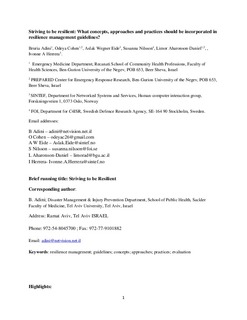| dc.contributor.author | Adini, Bruria | |
| dc.contributor.author | Cohen, Odeya | |
| dc.contributor.author | Eide, Aslak Wegner | |
| dc.contributor.author | Susanna, Nilsson | |
| dc.contributor.author | Limor, Aharonson-Daniel | |
| dc.contributor.author | Herrera, Ivonne Andrade | |
| dc.date.accessioned | 2017-12-07T09:41:31Z | |
| dc.date.available | 2017-12-07T09:41:31Z | |
| dc.date.created | 2017-06-01T12:00:55Z | |
| dc.date.issued | 2017 | |
| dc.identifier.citation | Technological forecasting & social change, 2017, 121, 39-49 | nb_NO |
| dc.identifier.issn | 0040-1625 | |
| dc.identifier.uri | http://hdl.handle.net/11250/2469516 | |
| dc.description.abstract | Resilience management guidelines address disruptions, changes and opportunities, facilitate anticipation, adaptation, flexibility and provide a foundation for an effective crisis response. The objective and novelty of the study were to propose a holistic framework that enables to evaluate and prioritise concepts, approaches and practices that should be incorporated into European guidelines for resilience management. Based on a modified Delphi process, 51 items achieved a consensus of > 80%. 84% of the items (n = 43) were ranked as important; 13.7% (n = 7) as essential; one ranked as somewhat important. The identified items encompass eleven categories as follows: 1) collaboration [11 items]; 2) planning [8 items]; 3) procedures [8 items]; 4) training [6 items]; 5) infrastructure [5 items]; 6) communication [3 items]; 7) governance [3 items]; 8) learning lessons [2 items]; 9) situation understanding (awareness) [1 item]; 10) resources [2 items]; and 11) evaluation [2 items]. The identified concepts, approaches and practices seem to be applicable to a wide range of domains and critical infrastructures, such as crisis management, air traffic management and healthcare, due to their generic and abstract characteristics. Important in the Delphi process is the engagement of potential end users in the development of resilience management guidelines to align this development to their needs. Therefore, the Delphi process involved policy and decision-makers, as well as practitioners and other personnel representing different critical infrastructures and academia, in prioritising concepts aimed at achieving resilient organisations, entities or communities.
© 2017 Elsevier Inc. All rights reserved. | nb_NO |
| dc.language.iso | eng | nb_NO |
| dc.title | Striving to be resilient: What concepts, approaches and practices should be incorporated in resilience management guidelines? | nb_NO |
| dc.type | Journal article | nb_NO |
| dc.type | Peer reviewed | nb_NO |
| dc.description.version | acceptedVersion | nb_NO |
| dc.source.pagenumber | 39-49 | nb_NO |
| dc.source.volume | 121 | nb_NO |
| dc.source.journal | Technological forecasting & social change | nb_NO |
| dc.identifier.doi | 10.1016/j.techfore.2017.01.020 | |
| dc.identifier.cristin | 1473455 | |
| dc.relation.project | EC/H2020/DARWIN - Expecting the unexpected and knowing how to respond | nb_NO |
| cristin.unitcode | 7401,90,12,0 | |
| cristin.unitcode | 7401,90,13,0 | |
| cristin.unitname | Nettbaserte systemer og tjenester | |
| cristin.unitname | Systemutvikling og sikkerhet | |
| cristin.ispublished | true | |
| cristin.fulltext | postprint | |
| cristin.qualitycode | 1 | |
